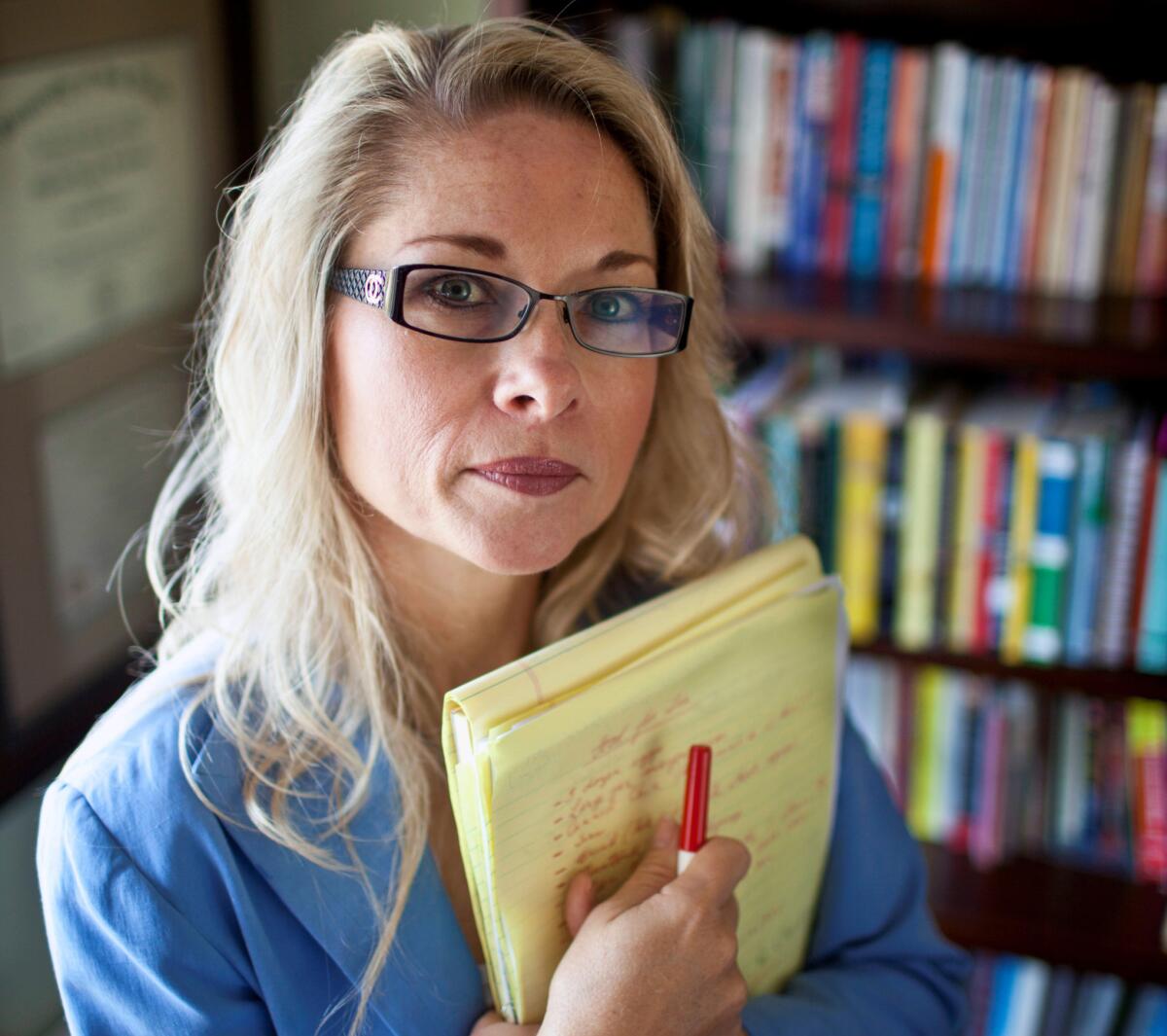Supreme Court weighs union fees for teachers: Is it a matter of free speech?

Rebecca Friedrichs, a veteran Orange County public school teacher, the lead plaintiff in the case.
- Share via
Reporting from Washington — The outcome of a major case on labor unions before the Supreme Court on Monday may turn on whether the conservative justices adopt a broad view of the free-speech rights of public employees, a position that liberals had favored before.
The justices will hear a 1st Amendment challenge brought by Rebecca Friedrichs and eight other California teachers who object to the “fair share fee” they must pay to their union.
They contend the laws in California and 22 other states are unconstitutional because they authorize these collective bargaining deals between unions and public employers, including a school district.
NEWSLETTER: Get the day’s top headlines from Times Editor Davan Maharaj >>
The case of Friedrichs vs. California Teachers Assn. has drawn wide attention because of its potential political impact. Public employee unions have strongly supported Democrats and have been targeted by several Republican governors.
But there has been less focus on the 1st Amendment issue at the heart of the case.
In the past, the high court has said public employees have quite limited free-speech rights. They have a right to speak out “as a citizen” on a “matter of public concern,” but they also said this right does not extend to workplace disputes.
Then, the court’s conservatives say the balance tips in favor of the employer trying to manage the workplace.
Ten years ago in an oft-cited case, the justices by a 5-4 vote rejected a free-speech claim brought by a deputy district attorney in Los Angeles County who said he was demoted after repeatedly objecting to the handling of a questionable police search warrant.
The U.S. 9th Circuit Court of Appeals said the deputy deserved free-speech protection because he was acting as a whistleblower on a matter of public concern.
But the Supreme Court disagreed in an opinion joined by Chief Justice John G. Roberts and Justices Antonin Scalia, Anthony M. Kennedy, Clarence Thomas and Samuel A. Alito.
“When a citizen enters government service, the citizen by necessity must accept certain limitations on his or her freedom,” Kennedy wrote in Garcetti vs. Ceballos. “Government employers, like private employers, need a significant degree of control over their employee’s words and actions; without it, there would be little chance for the efficient provision of public services.”
Now the ideological tables are turned, and the conservative lawyers who filed the suit against the teachers unions are looking for the same five justices to rule for them.
They say the 1st Amendment should protect public employees from being forced to subsidize the union’s demands for higher wages.
This is “compelled speech” involving “controversial issues of fiscal and education policy,” said Washington attorney Michael A. Carvin, a prominent conservative who twice argued for striking down President Obama’s healthcare law.
Opposing them, liberal lawyers for the Obama administration, the California attorney general and the teachers unions are citing Kennedy’s opinion as a basis for upholding the forced fees.
They say these fees pay for collective bargaining over wages and working conditions and for the handling of grievances. These involve classic workplace matters, they argued.
“No public employee is prohibited from speaking out against the union,” wrote U.S. Solicitor Gen. Donald Verrilli. And the mandatory fees do not support the union’s political activity, he added.
Join the conversation on Facebook >>
And for those who adhere to the original history of the Constitution, Verrilli’s brief pointed out that the notion of constitutional rights for public employees arose in the 1960s.
Before that time, the prevailing view was summed up by Justice Oliver Wendell Holmes, who quipped a policeman “may have a constitutional right to talk politics, but he has no constitutional right to be a policeman.”
A free-speech ruling in favor of the anti-union teachers could have an impact in other areas. For example, the court upheld mandatory state bar fees for lawyers in 1990 and did so by citing its earlier ruling upholding mandatory fees for unionized teachers.
Carvin is asking the court to overturn that precedent in the 1977 case of Abood v. Detroit Board of Education.
Until now, the court has not taken such a broad view of the free-speech rights of public employees, said Washington attorney Andrew Pincus, who filed a brief supporting the unions.
“If you are a science teacher, and you don’t want to teach evolution, you can’t just say it would violate your free-speech rights,” he said.
Twitter: @DavidGSavage
ALSO
To stop bullying, get the popular kids on board
L.A. Unified school board still struggling to name leader
The sooner you turn in the federal student aid application, the better
More to Read
Sign up for Essential California
The most important California stories and recommendations in your inbox every morning.
You may occasionally receive promotional content from the Los Angeles Times.











